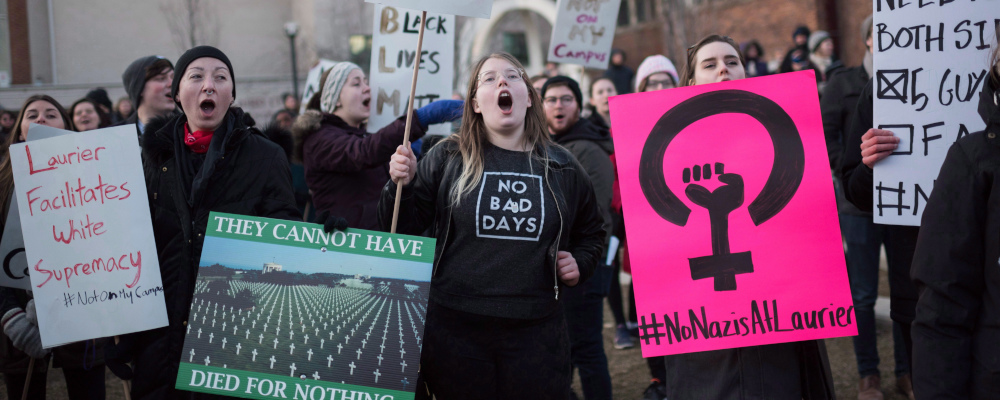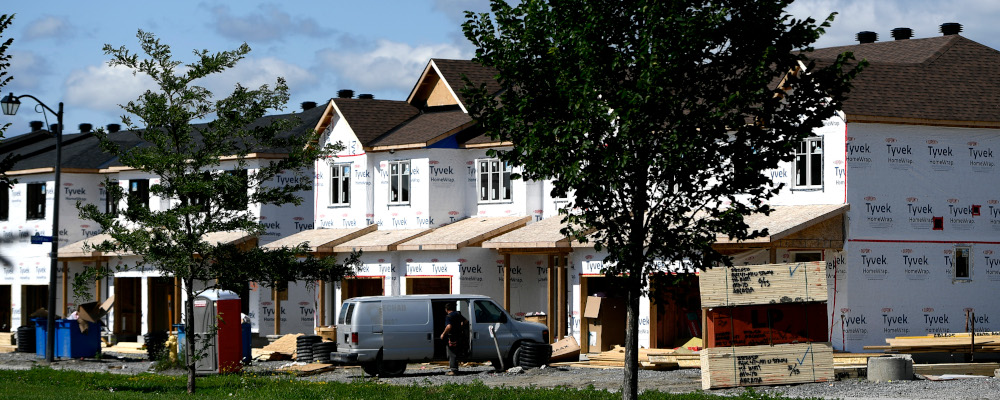I’m a 57-year-old American tenured professor of English at the University of Toronto—a lifelong moderate Democrat on the U.S. political spectrum. I grew up in a parochial lower-middle-class, white-ethnic-Catholic world in Long Island, New York—mostly Irish-American, Italian-American, Polish-American, and German-American. This is not a subculture known for progressivism on matters of race. But my parents, a high-school teacher and a nurse, taught a version of what we now call antiracism as a direct corollary of their firmly held Roman Catholic Christianity. “Whatever you do unto the least of my brethren,” Jesus taught, “you do unto me.” It didn’t require a university course for my parents to know who was the “least of their brethren” in American society in the 1950s and ’60s as they started and raised their brood of five boys.
Our home atmosphere was far from genteel, but the N-word was never spoken there. My mother, who had grown up in northernmost rural Vermont and almost never encountered a black person before she was 20-years old, nevertheless saw to it that at least some of her boys watched serious television reporting or dramatic series dealing with race, such as episodes of Sixty Minutes, or Roots, or a biopic about Martin Luther King, Jr. My father, an Irish American World War II veteran, participated in civil rights demonstrations. My brothers and I reveled in the excellence of many African-American athletes and musical performers. A tone of matter-of-fact respect and ambient Christian compassion for African Americans and all other dominated, brutalized peoples—including and especially Native Americans, poor-white southerners, the Irish, and Jews—ran through our laconic family exchanges, such as they were, about history, politics, and public events. After my father died, our sympathies for the poor in spirit were sharpened by firsthand experience of economic precariousness and the many ills thereof.
Given the scale of the injustice faced by African Americans and other racial minorities in the U.S., these might seem like trivial measures of solidarity. But they were sincere efforts by stressed, distressed, and not especially privileged folks doing their moral best within constrained circumstances. Not crusaders or intellectuals, my parents nevertheless drew on what they learned in Church and in the media to help their unruly and spirited children, in Harriet Beecher Stowe’s words, to “feel right” with regards to race. And their modest efforts had lasting effects. My brothers all went kind of wild after my Dad died, and their talk was dotted by an astounding variety of curses, but to this day I have never heard a racist word from any of them. For my part, the Sermon on the Mount and those television shows moved me to the quick. Together with my mother’s frequent expressions of empathy for every sort of abject person or group, they shaped my moral-political sensibility for a lifetime.
As I grew older and pursued a Ph.D. in American literature, I eagerly read many African American authors, though this was not my specialty. I learned as much as I could about slavery, racism, and African American history. In my last year as a graduate student at Harvard, I directed the Dorchester location of “The Clemente Course in the Humanities”—a nationally acclaimed program in educational outreach to underserved communities. Accredited by Bard College, the Clemente course provided free university-level seminars in the humanities, as well as professional childcare during class time, to adults who had not had the chance, or the resources, to pursue post-secondary education. Two nights a week for a year I walked across one of Boston’s racial boundary lines to discuss Aeschylus, Dante, Wordsworth, Langston Hughes, and Zora Neale Hurston, among other classic writers, with a wonderful group of determined adult learners, mostly African American women. It was the most joyful, rewarding experience in my mostly happy thirty years as a teacher. And I made friends! Nowadays as a professor assigned to teach surveys of the whole arc of American literature in historical context, I pay extensive attention to African American authors and other minority writers, and to issues of slavery and race. For several years I gave an advanced undergraduate seminar devoted entirely to the writings of James Baldwin, whose subtle intelligence, civic passion, and supple sentences I greatly admire, though I disagree with many sweeping anti-white statements he made in the later years of his life.
None of this, alas, spared me from imputations of racist motivation by a former student, a Canadian who is now a professor at an American university, nor from the University of Toronto administration’s complicity in advancing a malicious distortion of my words. Some months ago, while scrolling down my Facebook page, I noticed a disturbing post by this “friend” in response to the horrific murders of East Asian massage-parlor workers in Atlanta. It said: “American friends, if you feel the urge to tell people that the Atlanta parlor shootings are ‘not who we are as a country,’ please don’t, because this is, in fact, exactly who America is.”
I was taken aback. Really? America as a whole is “exactly” akin to a homicidal racist murderer? My professor “friend” seemed to have chosen his words carefully. He did not lament that the American population, (like most large groups of people all around the world), harbours a great deal of xenophobia as well as some very sick racist people. Nor did he make the commonplace but important point that slavery, segregation, anti-black racism, and other forms of racial hatred have left a special scar on American history and national identity—a scar made all the uglier by its stark contrast with the country’s emancipatory founding principles. He rather pointedly and emphatically denigrated America as a symbol and all Americans per se by equating them in their entirety with a depraved murderer. It was as if I had equated Saudi Arabia and all Saudis with Osama bin Laden. If I stated in any forum that ordinary Saudis should not seek to differentiate themselves from bin Laden—“this is exactly who Saudi Arabia is”—I would expect to be harshly criticized, censored, perhaps fired. Why, I wondered, did this scholar feel entitled to denigrate America as a symbol and all the American people in this categorical fashion?
The more I thought about the statement the more offensive it seemed. I wondered whether my “friend’s” essentially homicidal America includes or excludes the tens of millions of African Americans who live there. They fought very hard for very long to be fully counted as Americans: how would they feel to be labelled in this way? What about the millions of American Jews who found in America a haven from a millennium of persecution and who have so often spoken up against demonization of others in their new homeland when they have witnessed it? In what sense are they essentially racist-homicidal? Are the very large numbers of recent Mexican and central and South American immigrants merely mistaken to have chosen to journey to America in pursuit of a basic level of security and opportunity? Maybe the professor just meant to refer to “white” Christian America or “white” Christian Americans? But if it is just “white” Christian Americans who constitute the nation’s homicidal core, how shall we determine who counts as “white” and Christian so that they may be duly designated for public chastisement and re-education? Perhaps we could circulate a questionnaire, or empanel an inquisition? What line, I wonder, should mixed-race folks be placed in? How shall they be taught to keep their homicidal half at bay?
The professor’s absurd essentialism also left out the inconvenient fact that America is home to tens of millions of flourishing and patriotic East Asian and South Asian immigrants and the children and grandchildren thereof. Do they form no part of its essential identity either? But isn’t that a racially exclusionary position? I have been married for 15 years to an East Asian woman, an immigrant from Taiwan, with whom I have two mixed-race children. I guess I can only hope for my children’s sake that my wife’s non-American and thus non-homicidal essence will override the hateful American identity fraction they get from murderous white Christian me. So far, I guess we’ve just been lucky in our many sojourns from Toronto to my homicidal homeland. We have managed to spend much pleasant time there with my extended family in the Trump-supporting suburb where I grew up, without my wife (or children) ever encountering even a flicker of racial hostility, let alone attempts on their lives.
I distilled these objections into a terse Facebook reply. Here is the entirety of it: “This is an offensive and ignorant and supremely arrogant statement. Just who are you to be able to pronounce judgments like this on 300 million people?” In response the professor first countered that there had been other incidents of anti-Asian violence in American history—which is true enough, but which hardly justifies defining a vast nation of people as essentially murderous. Then he played the race card: “I also live in X (an American city), by the way, so keep your self-righteous bullshit off my wall. It may make you feel good to go around yelling at people of color to soothe your Hurt White Feelings [his caps]. But I have zero patience for it.”
While my statement, as readers can see above, was sharp in tone, there was nothing about it that could be reasonably construed as “yelling”. The professor’s statement was much more like “yelling” in its imperative voice and its use of obscenity. Nor had I made any allusion to the “color” of the professor because it was a matter of indifference to me: I would have responded sharply to the statement’s manifest erroneousness and malignity regardless of its author’s ethno-racial or national origins, which are Canadian and apparently South Asian. A great many students of every hue from thirty years of my teaching can attest that I am quick to criticize broad and facile ideological simplifications of complex historical realities. In this I gratefully follow the example of the many rigorous and demanding teachers who trained me both at Yale and Harvard. In my experience no ethnic group has a corner on sloppy thinking. In fact, my interlocutor’s invocation of “Hurt White Feelings” has far more in common with racist discourse than what I said.
Let’s just pause a moment to consider the baneful enormity of the professor’s rhetoric. To put it plainly, he dismissed my objection on racial grounds. He responded to my criticism of his absurd and grandiose essentialist assertion by using a crude racial term—“Hurt White Feelings”—to mock my concerns and to discount them as such. In doing so he also deployed an ominous racist taxonomy of human affect. To speak of “white feelings” is to open the door to similarly essentialist categorizations of “Black” or “brown” or “yellow” or “Jewish” or “Aryan” feelings and the like. This was in fact one way that apologists for African slavery defended the brutalization of Black bodies and minds: they held that “Black” feelings were not as sensitive as “white” ones. If you prick them, they argued, contra Shakespeare, they do not bleed—at least not inwardly.
The rejection of such archaic essentialisms of affect has long been a pillar of antiracist writing. Langston Hughes targets precisely such spurious and invidious racial-affective categories in “Theme for English B” when he evokes the large commonality of human feeling: “well, I like to eat, sleep, drink, and be in love. / I like to read, learn, and understand life.” Early in his career, James Baldwin also repeatedly urged his readers, white and “colored”, to give up on the fruitless and fratricidal wish to sort Blacks from whites because the two peoples were inescapably bonded by hard historical experience, sexual mingling, and tangled mutual feeling: “… this is a wedding. Whether I like it or not, or whether you like it or not, we are bound together forever. We are part of each other.” (221 “In Search of a Majority”) He frequently addressed himself to a national psychic space of ineradicably intermeshed affect: “Because there is something that unites all of these people and places. What does it mean to be an American? What nerve is pressed in you or me when we hear this word?” (227 “Notes for a Hypothetical Novel”)
Perhaps it was the professor’s bid to slice up this precious common nerve that angered me. Or perhaps it was his all-knowing racializing negation of my own and many other Americans’ surely imperfect but serious antiracist education and efforts. In any case, that pricked nerve now sang out. I replied again, this time indignantly and intemperately. “You are a smug, self-righteous idiot with a wildly inflated sense of your intelligence. Your reflexive recourse to racial categories shows you are the racist, not me. I’m not the one lumping people into groups and presuming to judge them. People like you are the reason most sensible people loathe the academic left. You can live in X for a thousand years, but as long as you keep saying things that begin with ‘America is… x or y’ you will reveal yourself to be the sloppy arrogant pretentious thinker I have long known you to be.”
I regret, to be sure, the ad-hominem character of the first sentence here. It is not my proudest moment as a participant in forums such as Facebook, and it is entirely uncharacteristic of me in my public capacity as a classroom professor, where I have often been praised for my equanimity in fostering lively discussion of widely divergent viewpoints. But in the interests of full disclosure, I thought it necessary to present every word of this post, along with the previous one, however unflattering to me, because they soon became the basis of an official university intervention, which I here wish to question. I trust that providing the entirety of both posts verbatim will show that while some of my words were intemperate, none of them bore even the slightest trace of racial impugnment. I thought this professor’s initial statement about America was deeply wrong and offensive to me as an American, and I said so. I thought his second statement—regarding my “Hurt White Feelings”—was quasi-racist and thus even more offensive to me personally, and I said so again, albeit intemperately and partially ad-hominem. I believe that both responses fall well within my right to free speech.
I learned from my department chair about a week later that a concerned “friend” of my interlocutor did not think so. S/he had written to the University of Toronto’s Antiracism and Cultural Diversity Office to complain about my words in the Facebook exchange. The chair noted that her letter had raised grave concerns among administrators at both the decanal and Provost level, that the letter was “circulating” through “channels”, and that meetings were ongoing. After the completion of these meetings, he and I would need to meet. I then spent an awful, anxious, insomniac week in a state of Kafkaesque dread as I awaited some sort of mysterious bureaucratic judgment that could damage my reputation and perhaps my livelihood, and which was already seriously impacting my mental health and general wellbeing. What had I said, I wondered, that warranted the involvement of the “Office of Antiracism and Diversity”? Yes, I had had a very unpleasant exchange that touched on a horrific racist incident and that involved a South-Asian-Canadian professor as an interlocutor. But the rancor of the exchange had been initiated first by my interlocutor’s categorical denigration of my own national identity and then by his race-based dismissal of my objections; I had myself made no use of racial language of any kind. The complete text of both of my posts, presented verbatim with all their intemperate warts in this article, shows this clearly.
As any reader can plainly read, I attributed the wrongness of the professor’s words to what I see as an all-too-commonplace ultra left-wing academic arrogance and sloppiness, not to any ethno-racial incapacity. (I am motivated to criticize this smugness in good part because I believe it is doing damage to the larger aim of antiracism.) Why was I being made to suffer for responding strongly as an intellectual to another intellectual’s ill-considered and counter-productive statements? The ironic answer is that I was automatically suspected of racial offense, notwithstanding a lifelong record of antiracist teaching, action, and scholarship, because I am “white”, and my interlocutor is “brown.” Perhaps those who seek to ferret out “unconscious racial bias” have unconscious racial biases of their own?
In my eventual meeting with the chair, I learned that only the good sense of University of Toronto’s lawyers had protected me from some sort of official administrative action. S/he read my posts to me in an admonishing manner, and s/he reiterated that s/he and higher-level administrators remained “very concerned” about them. But s/he reported in a regretful tone that U of T’s lawyers had advised them that “there was nothing they could do about them.” (Just what, I wonder, had they wanted to do?) S/he did not even deign to respond to my pointing out that my interlocutor was the only one to have used racial language, and that his posts categorically demeaned my historical identity—American, and thus denigrated almost everyone I know and love. Nor was s/he willing to consider that the “friend’s” letter to the Antiracism and Cultural Diversity Office might have been mischievously and maliciously designed to cause me anxiety and to damage my reputation and thus my career. At the end of the meeting s/he applied further pressure by asking whether I would be attending an upcoming antiracist training session.
I was of course relieved to hear that no action had been taken, but I also felt that much harm had already been done. For one thing, my longstanding devotion to universities as citadels of free inquiry and free speech had been dealt a serious blow. Long a joyous beneficiary and would-be extender of the emancipating energies of North American academic life, I have begun to doubt my place therein. At the leading Canadian university, I have been brought face to face with an emergent atmosphere of persecutorial ideological conformity, language policing, scapegoating, and censoriousness. This is starkly inimical to intellectual freedom, and chilling to free speech. I am by nature easygoing and slow to take offense, but this experience has sickened and chilled me to the bone.
In the largest view, my radical friends might argue, one white professor’s nausea doesn’t amount to a hill of beans. The greater good of hastening the demise of the terrible blight of racism justifies a bit of academic-bureaucratic heavy-handedness. But similar reports from many other schools, scholars, and other institutions throughout North America suggest that U of T’s inquisitorial turn is not atypical. And the aversion of a broad swath of moderate white Americans from such reverse-racist woke tactics is everywhere apparent. The great shame and lost opportunity herein are that a great many of these moderate lower-middle-class white folks were probably given non-radical, non-systematic Christian antiracist orientations similar to my own. The academic left’s lapse into racial essentialism is thus likely endangering the progress of antiracism by depriving progressives of a morally and electorally indispensable moderate white ally in the large American populace: the Biden piece, if you will, of the successful Obama-Biden-Harris-Clyburn-Stacey Abrams coalition; decent non-militant ordinary citizens like my parents.
In any case, history shows that antiracism advances best when joined to scrupulous regard for the whole set of core liberal freedoms. 19th-Century abolitionism depended for its success upon freedom of the press. Martin Luther King, Jr. and Nelson Mandela never tired of cautioning their adherents against violating others’ rights in the process of asserting their own. It ought to be axiomatic that liberal progress cannot be lastingly secured by illiberal means. Ordinary Canadians and Americans who pay the high taxes and higher tuitions to fund their countries’ great institutions of liberal education ought to be apprised and gravely concerned about their recent illiberal direction.
Recommended for You

Gili Zemer and David Mandel: We are Canadian Jewish parents. The Toronto District School Board has failed to protect our kids

The Weekly Wrap: It’s time to cut through Chesterton’s Fence and implement sweeping reform in Canada

Has the Left lost its masculine energy?

Ginny Roth: J.D. Vance, Pierre Poilievre, and how they slice their economic pie









